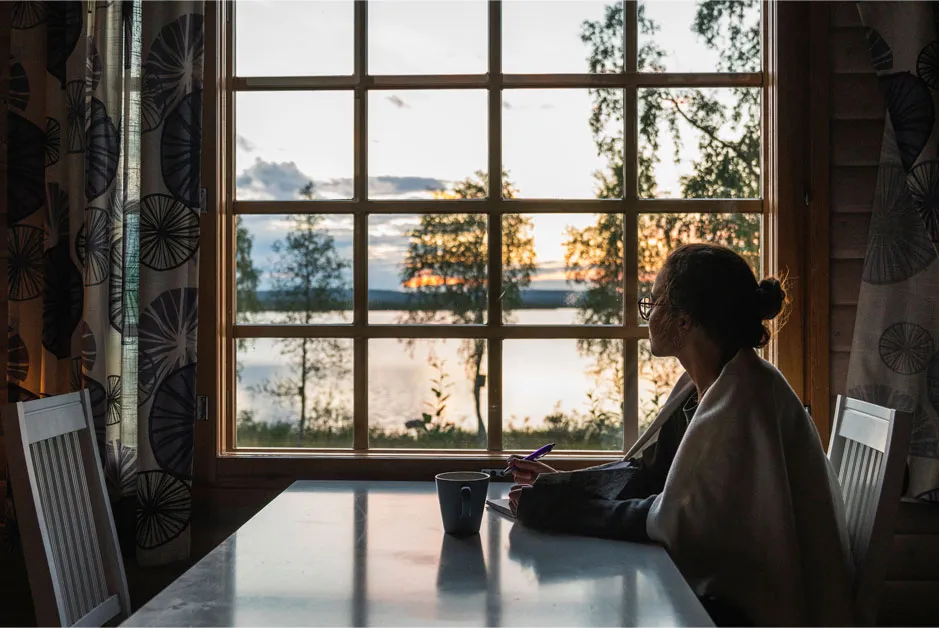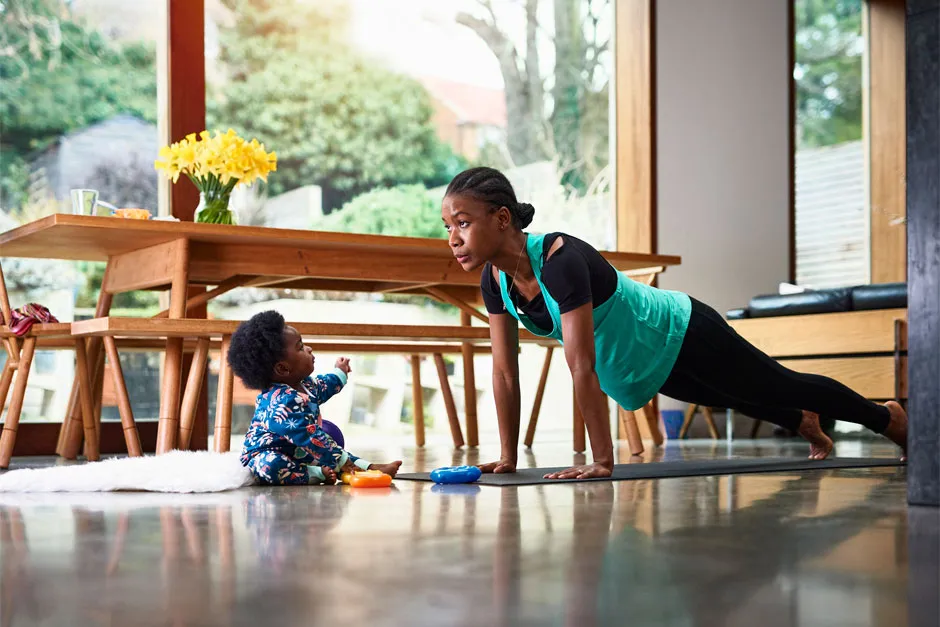If you’d been told in January that you’d be able to work from home for months on end - dodging overcrowded trains and office politics in the process - it might have sounded like a start-of-the-year bonus. The reality, of course, is not so enjoyable.As the world adjusts to the coronavirus pandemic, one of the biggest changes is enforced home working.
Staying motivated, retaining work-life balance and video conference etiquette are just some of the challenges. But science is here to help.
Even before quarantines and social distancing measures became the norm, researchers debated what remote working does to your mental health and productivity. So we conference-called leading psychologists to ask them how best to thrive in the shadow of COVID-19.
1
Dress for the job you still have
Fashion doesn’t really exist when the world is on lockdown, but psychologists recommend you get dressed for work rather than joining those video calls in your PJs. More than just keeping up appearances, it helps to put your brain in work mode.
In a 2012 paper in the Journal of Experimental Social Psychology, researchers use the term “enclothed cognition” to describe the way that clothes can affect the wearer’s behaviour. In the study, participants who wore a white lab coat performed better in tests of their attention, for example.

If you would normally wear a shirt to work, wear one in the home office too. “Get dressed in the morning, make yourself feel like you’re going to work,” says Professor Cary Cooper, an occupational psychologist at Manchester Business School. “But be comfortable.”
Don’t skip the shower, either. There’s bracing evidence to suggest that a cold shower can boost your mood and attention.
2
Structure Your Day Like Normal
Routine and structure are crucial to making the quarantine period tolerable, and that starts with your sleep. Resist the urge to hit the snooze button. In what was described as the largest sleep study ever conducted, researchers at Canada’s Western University found that oversleeping can dampen your cognitive function just like sleep deprivation can.
“Research shows that keeping routines, but with some variation - having different exercises and tasks at different times - is really important,” says Jo Daniels, a clinical psychologist at the University of Bath.
Do something positive with the time you saved from your commute, such as cooking a healthy lunch or going for a jog.
Read more about productivity at work:
- Four-day week: could the UK be more productive by working less?
- Biohacking: the key to optimal performance?
Then work according to your own circadian rhythms. “Structure your workload depending on whether you’re an owl or a lark,” says Cooper. “Do the most important work when you feel most energised, unless it has to be done before. If you’re a slow starter, doing menial tasks first and important tasks later is maybe the way to go.”
You can also create a more effective list of priorities by making a weekly to-do list, rather than a daily one - the truly important jobs will jump straight out at you.
3
Protect your mental health
As if a lethal pandemic wasn’t enough to trigger anxiety and depression, research suggests that remote workers can also be prone to bouts of poor mental health. A UN report in 2017 found that remote workers are more likely to experience high stress levels than office workers: emails are misinterpreted, work bleeds into family life and remote workers often clock more hours.
As well as switching off the laptop at the end of the day, make sure you do pleasurable activities for mood elevation, says Daniels. “If you feel yourself becoming anxious, switch to exercise, reading, listening to podcasts, creative pursuits, intellectual pursuits.”
Also take this time to catch up with friends and family and get to know them like never before. “It’s important that we stay in touch with people but also that it’s not just a touch-base focus on the coronavirus. Actually show interest in the other person,” Daniels says.
She adds that if you suffer acute moments of panic or anxiety, practising breathing techniques can help, as can talking about your emotions. Otherwise, try to look for the benefits of being at home. “For me, I don’t have to travel miles to work everyday and that’s great.”
4
Create boundaries
Do what you can to physically separate your working space from your living space, especially if you have kids at home. Even the shortest distraction can kill your productivity. Research at Michigan State University found that a three-second interruption can double the number of mistakes you make in your work as your attention gets dragged away to something else.
Don’t have kids? Then self-isolate from that other great dependant: your phone. A study at the University of Southern Maine found that when testing complex tasks, the mere presence of the experimenter’s phone (not the participants’) was enough to distract people and lead to lower scores in the test.
Stepping away from tasks occasionally is a good idea, though. “Get away from the computer but keep a pad and pen with you,” says Carter.
Research at Indiana University found that longhand writing improves creativity and problem solving, while journaling is said to be an effective way to stretch your attention span.
5
Sit near a window
The field of environmental psychology, which explores our relationship with our immediate surroundings, has lots to teach us about being stuck indoors and creating an office in the home.
“The first thing to think about is where to sit,” says Lily Bernheimer, director of Space Works Consulting.
She refers to a concept known as ‘refuge and prospect’, which says that humans are more comfortable sat with our backs to the wall and a view of the door or window. “We believe that we evolved to prefer these settings because these factors could have contributed to our survival by being the safest places we could be.”

A view of trees or even a picture of scenery on your wall can help. “If you can find a room with a view of any kind of nature then this has the ability to reduce blood pressure and the circulation of stress hormones, and it increases the capacity for directed attention, which is the ability to focus.”
6
Adjust the thermostat
It’s tempting to think that you can hack your productivity by setting light, temperature and other conditions to optimal levels. It’s true to an extent, says Bernheimer.
“There are certain benchmarks and types of light that are better for relaxing or concentrating but what we also find is that holding constant settings throughout the day will not make the best environment for concentration.”
Read more about mental health:
- Even light activity reduces risk of depression in young people, study suggests
- Staying socially active in middle age could help keep dementia at bay
- World Of Warcraft and similar online games can offer a lifeline to disabled people
She advises you mimic what happens outside, exposing yourself to different kinds of light. “Cooler light is believed to be better, generally, for concentration, but it’s not natural for us to have that cool light throughout the whole course of the day.”
The same is true with temperature, noise and air flow: vary them for best results. “There’s really interesting research that shows both mildly cold and mildly warm environments increase human metabolism and this counterbalances excess energy intake,” Bernheimer says. That’s good for the stockpiled Jaffa Cakes as well as your alertness.
7
Arrange a meeting (or three)
A commonly told joke at the start of the pandemic said that one thing the coronavirus would teach us is whether all those meetings could have been emails after all. Excess meetings may have been a bugbear of the pre-COVID-19 workplace but right now, they’re essential. And not just for much-needed human contact, Cooper says.
“The individual manager’s role is suddenly more important than ever before,” he says. “Reassure, motivate and make your team feel secure. Don’t just email people. You have to do it eyeball to eyeball.”
Use technology like Skype, Slack and Zoom, especially when problems arise. Cooper says this will minimise misinterpretations and prevent time-wasting chains of emails that devour your day.
It might also make your team more effective. A study in the Journal of Organizational Behavior found that teams who met regularly for debriefs produced more innovative solutions to problems. Appoint somebody to lead the meeting, review recent work and brainstorm ways of improving.
8
Work out to work well
In 2019, the Journal of Human Sport And Exercise reported on a 12-week exercise programme conducted in a Greek prison. In line with all the existing evidence, it found that participating inmates felt a greater sense of self-esteem and quality of life than those who didn’t take part.

Now that COVID-19 has us all confined to our homes, we should all be doing the same as those Greek prisoners. Because as well as the health benefits and the regular dose of serotonin, getting a sweat on can also improve your work.
Researchers at the University of Georgia found that even low-intensity exercise can boost your energy levels, making you better able to face your to-do list.
Follow YouTube videos or apps and mix your workouts between cardio, bodyweight exercises and yoga. The latter has been linked to improved working memory by researchers at Texas State University.
9
Combat loneliness
“Remember we’re social animals,” says Dr Angela Carter, associate fellow at the British Psychological Society. “Part of the reason we go to work is that we love being with other people.”
Nobody should take the threat of loneliness lightly during the pandemic because it can lead to poor mental and physical health in other areas.
Read more about loneliness:
- Hikikomori: identifying extreme social isolation around the globe
- You are not alone: dealing with the epidemic of chronic loneliness
- What nature can teach us about friendship in the time of coronavirus
Petting your pets and face-timing your family are no-brainers, but don’t forget about your colleagues, too. “Using virtual spaces to meet up is really good,” says Professor Pamela Qualter, a specialist in loneliness research at the University of Manchester. “But there is a temptation to use those just for work meetings.”
She says that a lot of the time we spend interacting at work is not actually about work (don’t tell your boss). “That type of interaction is likely to be what we miss when we are self-isolating. So, I would recommend meeting colleagues or friends on-line for regular coffee breaks or lunch, so you don’t miss out on that type of social interaction.”
10
Learn something new
Work is likely to slow down for many people during the pandemic but this in itself can create an opportunity. “Think about what else you can do during this period to develop another line to your work,” says Cooper. “Maybe an IT course, maybe a language, do something to keep yourself cognitively active. You might never get this kind of window to learn something again. Use it.”
As well as bolstering your long-term employability, lifelong learning is proven to improve happiness as well as cognitive traits like memory. And the literature is full of tips to help you learn more effectively.
One of the most important is to rest after acquiring new information. This seems to allow your memory to consolidate what you’ve just learned. And a 2019 study in the journal Current Biology found that even taking regular 10-second breaks while you’re learning can improve your ability to pick up new skills.
From our partners - How to keep yourself healthy, happy and safe during the coronavirus pandemic:
- Enjoying nature despite COVID-19 [via Discover Wildlife]
- Fun craft ideas for kids to make at home [via Gathered]
- Bingeworthy space and astronomy podcasts for those in self-isolation [via Sky at Night Magazine]
- Astronomy in isolation: stargazing activities for those stuck at home [via Sky at Night Magazine]
- How to cope with anxiety and take care of your mental health during the coronavirus pandemic [via Calm Moment]
- 17 ways to practise self care when working from home [via Calm Moment]
- Coronavirus wellness resources to help you stay positive [via Calm Moment]
- “The very sight of her hands did almost turn my stomach”: a brief history of hand-washing [via History Extra]
- Coronavirus: a historical perspective [via History Extra]

